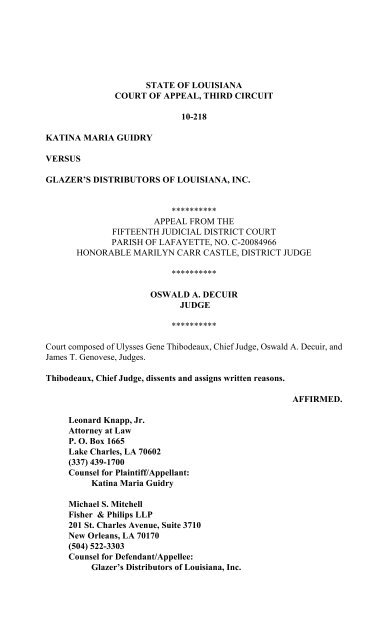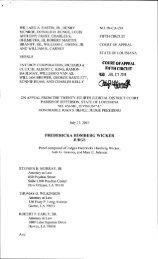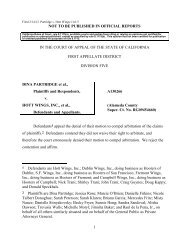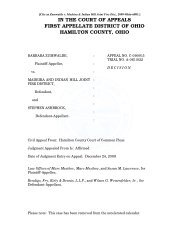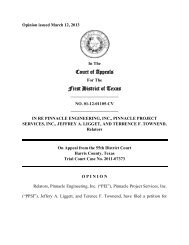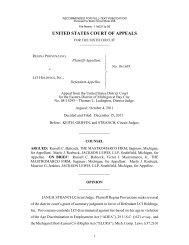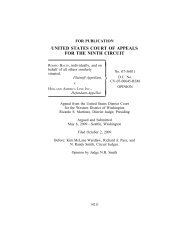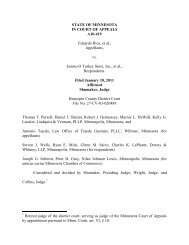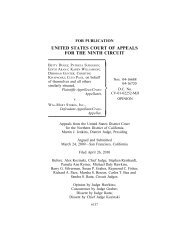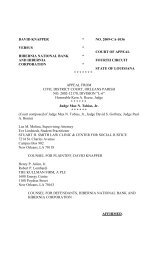state of louisiana court of appeal, third circuit 10-218 ... - LawMemo
state of louisiana court of appeal, third circuit 10-218 ... - LawMemo
state of louisiana court of appeal, third circuit 10-218 ... - LawMemo
Create successful ePaper yourself
Turn your PDF publications into a flip-book with our unique Google optimized e-Paper software.
KATINA MARIA GUIDRY<br />
VERSUS<br />
STATE OF LOUISIANA<br />
COURT OF APPEAL, THIRD CIRCUIT<br />
<strong>10</strong>-<strong>218</strong><br />
GLAZER’S DISTRIBUTORS OF LOUISIANA, INC.<br />
**********<br />
APPEAL FROM THE<br />
FIFTEENTH JUDICIAL DISTRICT COURT<br />
PARISH OF LAFAYETTE, NO. C-20084966<br />
HONORABLE MARILYN CARR CASTLE, DISTRICT JUDGE<br />
**********<br />
OSWALD A. DECUIR<br />
JUDGE<br />
**********<br />
Court composed <strong>of</strong> Ulysses Gene Thibodeaux, Chief Judge, Oswald A. Decuir, and<br />
James T. Genovese, Judges.<br />
Thibodeaux, Chief Judge, dissents and assigns written reasons.<br />
Leonard Knapp, Jr.<br />
Attorney at Law<br />
P. O. Box 1665<br />
Lake Charles, LA 70602<br />
(337) 439-1700<br />
Counsel for Plaintiff/Appellant:<br />
Katina Maria Guidry<br />
Michael S. Mitchell<br />
Fisher & Philips LLP<br />
201 St. Charles Avenue, Suite 37<strong>10</strong><br />
New Orleans, LA 70170<br />
(504) 522-3303<br />
Counsel for Defendant/Appellee:<br />
Glazer’s Distributors <strong>of</strong> Louisiana, Inc.<br />
AFFIRMED.
DECUIR, Judge.<br />
Katina Maria Guidry <strong>appeal</strong>s the trial <strong>court</strong>’s award <strong>of</strong> summary judgment in<br />
favor <strong>of</strong> Glazer’s Distributors <strong>of</strong> Louisiana, Inc. (Glazer’s), dismissing her action for<br />
employment discrimination in violation <strong>of</strong> La.R.S. 23:332. Guidry, whom Glazer’s<br />
terminated after she failed to report for work as scheduled, alleges that Glazer’s<br />
terminated her because <strong>of</strong> her gender. Glazer’s argues that it terminated Guidry after<br />
she violated company policy. The trial <strong>court</strong> granted Glazer’s motion for summary<br />
judgment, concluding that Glazer’s set forth a legitimate nondiscriminatory reason<br />
for Guidry’s termination and that Guidry failed to <strong>of</strong>fer evidence that Glazer’s treated<br />
her disparately. For the following reasons, we affirm the judgment <strong>of</strong> the trial <strong>court</strong>.<br />
FACTS<br />
At the time <strong>of</strong> her termination, Guidry was one <strong>of</strong> two women employed in the<br />
warehouse at Glazer’s. Guidry normally worked the night shift at Glazer’s, beginning<br />
at 5:00 p.m. and ending at approximately 3:30 a.m. the next day. The incident leading<br />
to Guidry’s termination arose when Guidry learned that a close family friend had<br />
died. The day before the friend’s funeral, Guidry asked her supervisor, Kevin<br />
Courville, if she could attend the funeral. Courville indicated that they were<br />
shorthanded and never gave Guidry express permission to take the night <strong>of</strong>f.<br />
On the morning <strong>of</strong> the funeral, Guidry called into work and left a message<br />
stating that she would not work her evening shift as scheduled. She then attended the<br />
funeral. Despite the fact that two <strong>of</strong> her fellow employees attended the funeral and<br />
returned to work, Guidry did not come in to complete her shift after the funeral. She<br />
returned to work the following business day. When she returned, Courville consulted<br />
with the Human Resource Director, Rusty Harmount, and the Branch Manager, John<br />
O’Reilly, before taking action. Glazer’s terminated her. Approximately one year
prior to Guidry’s termination, Terry Matte overheard Courville commenting that he<br />
was not going to hire any more women to work in the warehouse. Steven Breaux and<br />
Nanette Leger also reported hearing a similar comment approximately one year after<br />
Guidry was terminated.<br />
Guidry filed a charge <strong>of</strong> discrimination with the U.S. Equal Employment<br />
Opportunity Commission and later brought this action. The trial <strong>court</strong> granted<br />
Glazer’s motion for summary judgment, and Guidry <strong>appeal</strong>s.<br />
LAW AND DISCUSSION<br />
Guidry contends that the trial <strong>court</strong> erred in granting Glazer’s motion for<br />
summary judgment. We disagree.<br />
In reviewing a motion for summary judgment, an appellate <strong>court</strong> “applies the<br />
de novo standard <strong>of</strong> review, ‘using the same criteria that govern the trial <strong>court</strong>’s<br />
consideration <strong>of</strong> whether summary judgment is appropriate, i.e., whether there is a<br />
genuine issue <strong>of</strong> material fact and whether the mover is entitled to judgment as a<br />
matter <strong>of</strong> law.’” Gray v. Am. Nat’l Prop. & Cas. Co., 07-1670, p. 6 (La. 2/26/08), 977<br />
So.2d 839, 844 (quoting Supreme Serv. & Specialty Co., Inc. v. Sonny Greer, 06-<br />
1827, p. 4 (La. 5/22/07), 958 So.2d 634, 638). “The judgment sought shall be<br />
rendered forthwith if the pleadings, depositions, answers to interrogatories, and<br />
admissions on file, together with the affidavits, if any, show that there is no genuine<br />
issue as to material fact, and that mover is entitled to judgment as a matter <strong>of</strong> law.”<br />
La.Code Civ.P. art. 966(B).<br />
A fact is material if it potentially insures or precludes recovery, affects a<br />
litigant’s ultimate success, or determines the outcome <strong>of</strong> the legal dispute. Smith v.<br />
Our Lady <strong>of</strong> the Lake Hosp., Inc., 93-2512 (La. 7/5/94), 639 So.2d 730. A genuine<br />
2
issue is one in which reasonable persons could disagree; if reasonable persons could<br />
reach only one conclusion, there is no need for trial on that issue, and summary<br />
judgment is appropriate. Id. Whether a fact is material is determined in light <strong>of</strong> the<br />
relevant substantive law. Weingartner v. La. IceGators, 02-1181 (La.App. 3 Cir.<br />
4/17/03), 854 So.2d 898, writ denied, 03-1388 (La. 9/13/03), 853 So.2d 645.<br />
part:<br />
Guidry alleges that Glazer’s violated La.R.S. 23:332, which <strong>state</strong>s in relevant<br />
A. It shall be unlawful discrimination in employment<br />
for an employer to engage in any <strong>of</strong> the following<br />
practices:<br />
(1) Intentionally . . . to discharge any<br />
individual, or otherwise to intentionally<br />
discriminate against any individual<br />
with respect to his compensation, or his<br />
terms, conditions, or privileges <strong>of</strong><br />
employment, because <strong>of</strong> the<br />
individual’s . . . sex . . . .<br />
(2) Intentionally limit, segregate, or<br />
classify his employees or applicants for<br />
employment in any way which would<br />
deprive or tend to deprive any<br />
individual <strong>of</strong> employment<br />
opportunities, or otherwise adversely<br />
affect his status as an employee,<br />
because <strong>of</strong> the individual’s . . . sex. . . .<br />
To recover, Guidry must prove that her gender played a part in the termination<br />
<strong>of</strong> her employment. She may establish gender discrimination through either direct or<br />
circumstantial evidence. See Rachid v. Jack in the Box, Inc., 376 F.3d 305 (5th Cir.<br />
1<br />
2004). The nature <strong>of</strong> the evidence determines the framework to be used in analyzing<br />
1Louisiana<br />
Revised Statutes 23:332 is substantially similar to Title VII <strong>of</strong> the Civil Rights<br />
Act <strong>of</strong> 1964. Thus, the outcome will be the same under the federal and <strong>state</strong> statutes. LA Day v.<br />
Catalyst Tech., Inc., 302 F.3d 474 (5th Cir. 2002) (citing Trahan v. Rally’s Hamburgers, Inc., 96-<br />
1837 (La.App. 1 Cir. 6/20/97), 696 So.2d 637).<br />
3
Guidry’s claim. See Trans World Airlines, Inc. v. Thurston, 469 U.S. 111, <strong>10</strong>5 S.Ct.<br />
613 (1985).<br />
McDonnell Douglas Corp. v. Green, 411 U.S. 792, 93 S.Ct. 1817 (1973)<br />
establishes the procedural framework for analyzing motions for summary judgment<br />
in cases which rely on circumstantial evidence <strong>of</strong> intentional discrimination. Under<br />
the McDonnell Douglas framework, Guidry must first establish a prima facie case <strong>of</strong><br />
discrimination. Willis v. Coca Cola Enterprises, Inc., 445 F.3d 413 (5th Cir. 2006).<br />
To establish a prima facie case, Guidry must show that: (1) she is a member <strong>of</strong> a<br />
protected class; (2) she was qualified for her position; (3) she suffered an adverse<br />
employment action; and (4) others outside the protected class who were similarly<br />
situated were more favorably treated. Ross v. Univ. <strong>of</strong> Tex. at San Antonio, 139 F.3d<br />
521 (5th Cir. 1998). If Guidry establishes a prima facie case <strong>of</strong> discrimination, a<br />
presumption <strong>of</strong> discrimination arises, and the burden shifts to Glazer’s to produce a<br />
legitimate, non-discriminatory reason for the challenged actions. If the employer<br />
produces a legitimate, non-discriminatory reason for the termination, the burden then<br />
returns to Guidry to raise a genuine issue <strong>of</strong> material fact that the non-discriminatory<br />
reason <strong>of</strong>fered by Glazer’s is merely pretextual. Willis, 445 F.3d at 413.<br />
Guidry may meet the burden <strong>of</strong> demonstrating pretext and thus avoid summary<br />
judgment “if the evidence taken as a whole (1) creates a fact issue as to whether each<br />
<strong>of</strong> [Glazer’s] <strong>state</strong>d reasons was what actually motivated [Glazer’s] and (2) creates<br />
a reasonable inference that [gender] was a determinative factor in the actions <strong>of</strong> which<br />
[Guidry] complains.” Vadie v. Miss. State Univ., <strong>218</strong> F.3d 365, 374 n.23 (5th Cir.<br />
2000).<br />
4
Guidry contends that she was wrongfully terminated because <strong>of</strong> her gender.<br />
Specifically, she asserts that though she was terminated when she failed to report to<br />
work after calling in, other similarly situated male employees received a less harsh<br />
method <strong>of</strong> discipline when they engaged in the same conduct.<br />
Because Guidry has not <strong>of</strong>fered direct evidence <strong>of</strong> discrimination, her claim is<br />
properly analyzed under the McDonnell Douglas framework. As noted above, to<br />
establish a prima facie case <strong>of</strong> discrimination, Guidry must show that: (1) she is a<br />
member <strong>of</strong> a protected class; (2) she was qualified for her position; (3) she suffered<br />
an adverse employment decision; and (4) similarly situated male employees were<br />
treated more favorably.<br />
Glazer’s does not dispute that Guidry satisfies the first three prongs <strong>of</strong> the<br />
prima facie standard. They question, however, whether Guidry <strong>of</strong>fered appropriate<br />
“similarly situated” comparators who Glazer’s treated more favorably than she. For<br />
this <strong>court</strong> to compare Guidry to other employees, she must show that she “was<br />
similarly situated to those other employees in terms <strong>of</strong> performance, qualifications,<br />
and conduct” and that no other unique facts differentiated their situations. Lester v.<br />
Sec’y <strong>of</strong> Veterans Affairs, 514 F. Supp.2d 866, 874 (W.D. La. 2007).<br />
We find that Guidry has not identified similarly situated comparators. Guidry<br />
cites two full-time warehouse workers, Earl LeBlanc and Casey Howard, whom<br />
Leger identified as individuals who missed work without notice and were not<br />
terminated. Rather, Glazer’s gave them “occurrences.” These individuals held the<br />
same position as Guidry, however, they were not engaged in the same conduct.<br />
Guidry did not just miss work without notice. Guidry sought permission to miss work<br />
and when that permission was not granted, she missed work anyway. Moreover<br />
5
unlike some <strong>of</strong> her other coworkers, she missed her entire shift when she could have<br />
come in after the funeral services. Her actions are clearly distinguishable from the<br />
comparators she <strong>of</strong>fers. Accordingly, we conclude that Guidry failed to establish a<br />
prima facie case under the McDonnell Douglas framework.<br />
Even if this were not the case, establishing a prima facie case merely shifts the<br />
burden to Glazer’s to <strong>of</strong>fer a legitimate, non-discriminatory reason for Guidry’s<br />
termination. Glazer’s submits that Guidry was insubordinate and violated company<br />
policy by not reporting to work as scheduled. When an employer claims that an<br />
employment decision was based on a legitimate reason, two questions must be posed.<br />
First, objectively, is the reason given “legitimate” under Title VII? St. Mary’s Honor<br />
Ctr. v. Hicks, 509 U.S. 502, 506-07, 113 S.Ct. 2742 (1993). If the reason is<br />
illegitimate on its face, the employer is liable. Id. Second, subjectively, is the<br />
employer’s reason merely a pretext for discrimination? Id. If so, then the employer<br />
is again liable. Id.<br />
Here, we find that Glazer’s reason for Guidry’s termination is legitimate on its<br />
face. Guidry failed to show up for her shift after having failed to obtain permission<br />
to do so. This was clearly insubordinate behavior and a violation <strong>of</strong> company policy.<br />
Guidry’s allegations regarding <strong>state</strong>ments by Courville in no way justify her<br />
insubordination nor call into question the legitimacy <strong>of</strong> Glazer’s actions in<br />
terminating her.<br />
Summary judgment procedure is favored in Louisiana and is designed to<br />
secure the just, speedy, and inexpensive determination <strong>of</strong> actions. La.Code Civ.P. art.<br />
966(A)(2). Cheramie Services, Inc. v. Shell Deepwater Prod., Inc., 09-1633 (La.<br />
6
4/23/<strong>10</strong>), 35 So.3d <strong>10</strong>53. Glazer’s motion for summary judgment was properly<br />
granted.<br />
CONCLUSION<br />
For the foregoing reasons, we affirm the judgment <strong>of</strong> the trial <strong>court</strong>. All costs<br />
<strong>of</strong> these proceedings are taxed to appellant, Katina Maria Guidry.<br />
AFFIRMED.<br />
7


